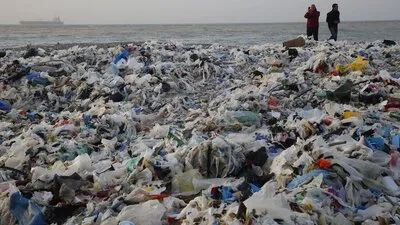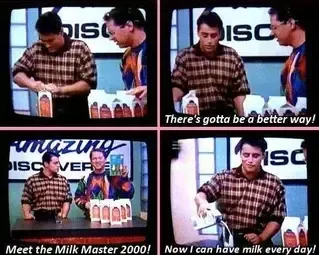- 11 Nov, 2025 *
The Unbearable Heaviness of Ease
In 1965, Swedish engineer Sten Gustaf Thulin invented the modern plastic bag. He’d noticed how many trees were cut down to make the then-standard paper bags. He figured a strong, thin polyethylene bag could fit in a pocket, be taken to the supermarket, and reused hundreds of times before wearing out.
We all know how that went.

I sometimes wonder: if he had foreseen the pollution these bags now cause, would he still have invented it – or would he have left things the way they were? Perhaps looked for other solutions? There are lots of inventions where you can wonder if the world wouldn’t be better off without them: [Teflon and PFAS](https://www…
- 11 Nov, 2025 *
The Unbearable Heaviness of Ease
In 1965, Swedish engineer Sten Gustaf Thulin invented the modern plastic bag. He’d noticed how many trees were cut down to make the then-standard paper bags. He figured a strong, thin polyethylene bag could fit in a pocket, be taken to the supermarket, and reused hundreds of times before wearing out.
We all know how that went.

I sometimes wonder: if he had foreseen the pollution these bags now cause, would he still have invented it – or would he have left things the way they were? Perhaps looked for other solutions? There are lots of inventions where you can wonder if the world wouldn’t be better off without them: Teflon and PFAS, for instance, were once seen as miracles of modern chemistry but became environmental culprits.
Of course: we can’t foresee the future. We can’t predict the effect of our inventions, or to what extent it will align with our intentions. Thulin actually imagined his bags being reused; it was the supermarkets that promoted single use. But even if the bags had been reused as he intended, it was already known that polyethylene doesn’t biodegrade, so Thulin could have realised that in the longer run they would accummulate in our environment.
There are also many inventions that are contrived, unnecessary, and wasteful. Milk cartons with a built-in Milk Master 2000 come to mind.
 Contrary to what “Kevin” wants you to believe, you don’t need a plastic pouring spout on a milk carton to have milk every day. Humanity has consumed milk from cartons without them for decades.
Contrary to what “Kevin” wants you to believe, you don’t need a plastic pouring spout on a milk carton to have milk every day. Humanity has consumed milk from cartons without them for decades.
The problem with many of these inventions is that people get used to them, even consider them necessities. We’ve internalized them as baseline comforts, things we feel entitled to, even when the ecological price is high.
My family has a WhatsApp group in which we notify each other of special events, and sometimes we discuss topical issues. On one occasion, we were talking about the detrimental effects that livestock farming has on the environment, and how horribly animals are treated in that industry. At some point, a Boomer aunt exclaimed in apparent disbelief: “What am I supposed to do about all that? Stop eating meat or something?” I suspect the younger generations in the chat either feared a heated argument, or they recoiled in second-hand embarrassment: the discussion fizzled out immediately after that. However, that comment always stuck with me: if, when faced with the facts, your own reasoning leads you to conclude that ‘stopping eating meat’ is the solution to very real problems, why is it so hard for someone to accept that and at least try to live in accordance with their own conclusions and beliefs? (Note that my aunt did not reject the facts.)
A few years ago I explained to my own (Silent Generation) mother how the rainforest is cut down to plant palm trees that supply us with palm oil, which is why I always buy peanut butter that consists of peanuts only. When I visited my mum a few weeks later, I noticed she had a new jar with peanut butter. Her regular brand, with palm oil. When I asked her about it, she mentioned that she’d given the 100% peanut butter a try, but didn’t like that she had to stir the peanut oil into the butter the first time she opened the jar. To her, the discomfort of having to stir for maybe 15 seconds outweighed the environmental damage done by the production of palm oil.
Behavioral economics calls this loss aversion: the pain of losing comfort is about twice as strong as the pleasure of gaining it. If consumers had not gotten used to being able to scoop peanut butter out of a jar without stirring first for a few seconds, few if any people would have craved that luxury.
Which is why people and companies about to launch new products should take a step back and ask themselves: what effect will this product have on people and the environment? If the product isn’t sustainable in some way, can we redesign it or its production process to make it truly sustainable? Sustainability isn’t anti-progress; it’s progress adjusted for foresight.
I’m aware that I probably sound like a tree-hugger here, but humor me and join me in this thought experiment:
Plastic. It’s made of oil, and once it enters the environment, it never leaves. (That by itself should be a pretty good incentive not to use it.) We may never run out of oil, but it will grow scarcer and therefore more expensive to extract. At some point extraction won’t even be financially viable.
The saying goes Necessity is the mother of invention
Try to get into that mindset: once oil becomes expensive, how will we make the products that we currently make out of plastic?
Whatever the answer to that question is, why don’t we do that right now and prevent vast amounts of plastic from seeping into the environment – and into ourselves? Plastic is nice and cheap, and whatever solution we come up with to replace it, it’s bound to be more expensive – at least initially. But isn’t that expense worth leaving a healthier planet for future generations? Since 1970, we’ve been using our planet as a credit card but that “credit card” carries interest: the younger generation, our kids, will be paying huge fees in various forms.
Let’s not wait until we’re forced to transition away from plastics (and other unsustainable products and practices, for that matter) after they have already ruined our environment.
Let’s bite the bullet now and start taking the inconvenient steps towards leaving our planet in better shape.
And remember: it requires producers to make sustainable products and consumers to bear the true cost.